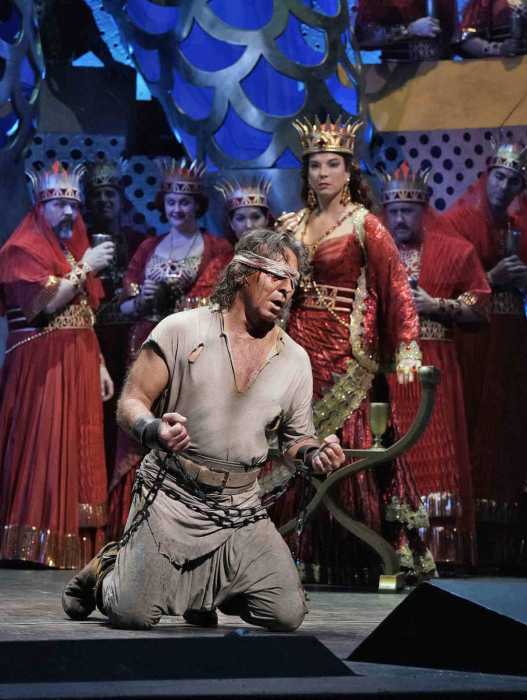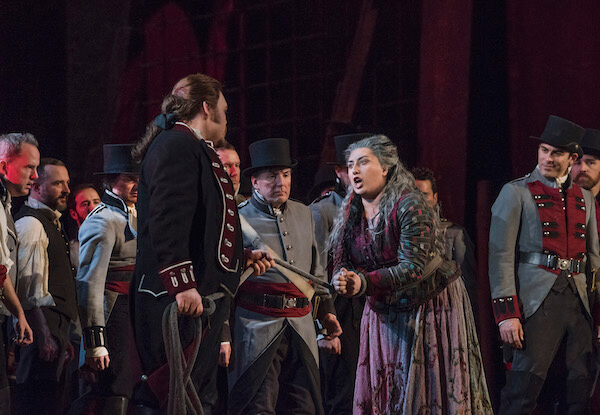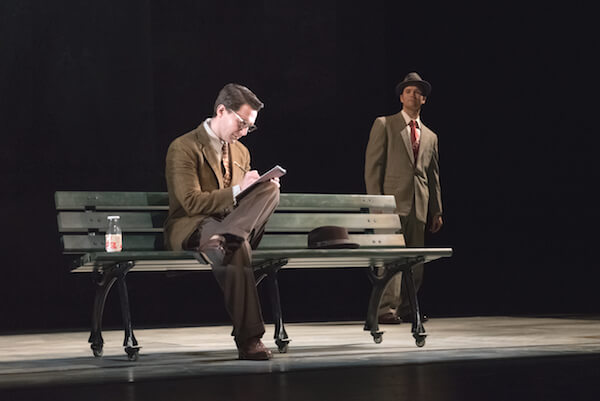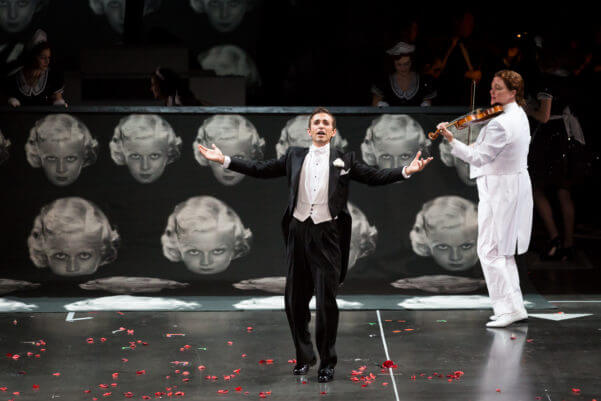Alice Coote and Paul Appleby in Nico Muhly’s “Two Boys.” | KEN HOWARD/ METROPOLITAN OPERA
I come late to the party in discussing Nico Muhly’s “Two Boys,” which just finished a run of seven Met performances –– indifferently received and poorly attended –– that marked the two-act work’s US premiere. The talented Muhly’s first opera, “Two Boys” premiered in 2011 at the English National Opera and was revised for the Met. I am in agreement with other commentators that there isn’t much opera here. The musical style is neither dissonant nor particularly lyrical –– a kind of spare minimalist tonal palette suggestive of Steven Reich or John Adams.
The layered and complex choral pieces, representing the constant flow of communication and information exchanged on the Internet, comprise the best and most interesting music in the opera. The orchestral part, too loudly scored, suggests a film soundtrack that creates mood but remains in the background. The vocal lines are conversational recitative devoid of musical color and individuality. Except for one lyrical arioso sung by the teenaged protagonist Brian extolling the Internet’s power to create its own personal reality, it is all just heightened speech.
Craig Lucas’ libretto resembles something written for a television drama –– musical expansion seems superfluous. Set a decade ago, the story (based on a real incident in Britain) concerns the attempted murder of a 13-year-old boy by a 16-year-old he met in an online chat room. A web of Internet deceit and seduction is revealed in police interrogations by the compassionate but relentless Detective Inspector Anne Strawson. The plot eventually becomes emotionally involving in the final third. But it takes too long to get there, and the audience is well ahead of the onstage characters in understanding how the Internet can enable role-playing and subterfuge.
Mulhy explores cyberspace, Bellini sticks to the real, but still brutal world
Bartlett Sher’s production, mostly dark scrims, drab furniture, and black and white projections create a monochromatically grim universe that complements Muhly’s moody, minor key score. The world of the Internet, a stage for the imagination and forbidden desire, is similarly antiseptic and utilitarian –– just white screens and points of light that look like screensavers.
The valiant and committed cast members –– led by the deeply moving Paul Appleby as Brian and the riveting Alice Coote as Strawson –– give it all they’ve got as do the supporting singers, chorus, and orchestra under David Robertson’s expert baton.
I think Muhly’s “Dark Sisters,” composed at roughly the same time as “Two Boys” (it premiered in November 2011 at the Gotham Chamber Opera) is better composed for the voice, works better as music drama, and shows more of what the 32-year-old composer is capable of in the operatic genre. If “Two Boys” is to have a future, it needs a radical revision and reduction. It would work as a chamber opera –– it felt padded and overblown on the Met stage –– with the story telescoped into an 85-minute-long one-act. Jettison Strawson’s underdeveloped backstory and unhappy personal life and make her purely a narrator and interrogator. The framing device could be her writing her report on the case and flashing back to her interviews of Brian. Her character would get a full aria at the end with her personal summation of Brian’s case.
The chorus could be reduced to a small ensemble who double as the other supporting characters. The music scored for a small chamber group would be spare and minimalist for the present-day real world, but the flashback cyber universe scenes need heightened musical language and style. If the required musical resources were reduced, the contemporary subject matter and the characters’ youth would make this attractive to student and chamber opera groups.
Deception is also at the core of Bellini’s “Norma,” which received a Met revival unveiling two remarkable American sopranos in the demanding title role –– Sondra Radvanovsky and Angela Meade. This is the most successful casting the Met has fielded since Sutherland and Caballé sang it in the early 1970s.
Radvanovsky is a fascinating vocalist but a frustrating artist. At the performance I attended on October 7, she was fluttery throughout the “Casta Diva,” but settled into a fiercely sung cabaletta. At the end of the first act trio, she eschewed the D she sang in other performances.
This is a taut, metallic voice that does hard things very, very well but simpler things less well. The jagged ascents to exposed high C’s on “Trema per te fellon” in the Act I trio and “Adalgisa perirà” in the Act II duet with Pollione were dispatched with brilliant ease and abandon. But legato passages lacked tonal smoothness and expressive shaping and could wander slightly in pitch. At the same time, Radvanovsky could deploy a sustained pianissimo, which she did often.
Despite the brilliant metal in the voice, Radvanovsky was temperamentally more a heartbroken wife and mother than a hell-hath-no-fury vengeful priestess. I never believed for an instant her Norma could strike mortal blows to her children or Pollione. A better conductor and colleagues and a production with a real director would perhaps help Radvanovsky pull together a more comprehensive, passionate interpretation. The materials are all there but haven’t coalesced. (Meade in the alternate cast had a softer grained voice of greater tonal beauty but less stamina on top.)
The remainder of the cast was uninspiring. Kate Aldrich, the Adalgisa, looked youthfully alluring but sounded like a washed-out comprimario –– the tone juiceless and tired except in a few loud upper middle phrases. As Pollione, Aleksandrs Antonenko unleashed a fiercely metallic dramatic tenor like a bull in a china shop. The first act cantilena suffered a bruising, but the second act defiance and declamation were stirringly sung. He is a virile and ardent stage figure. James Morris as Oroveso looked venerable and his bass is still potent in the middle, but the tone has loosened and grayed on both bottom and top.
Riccardo Frizza led a dashing overture, but from then on the rhythmic pulse was lax and he overindulged the singers. John Copley’s production looks like it was put together from leftover scenery from a “Ring” and cutout backdrops furnished with black painted wooden benches from the rehearsal studio. Bellini and these two Normas deserve better.



































